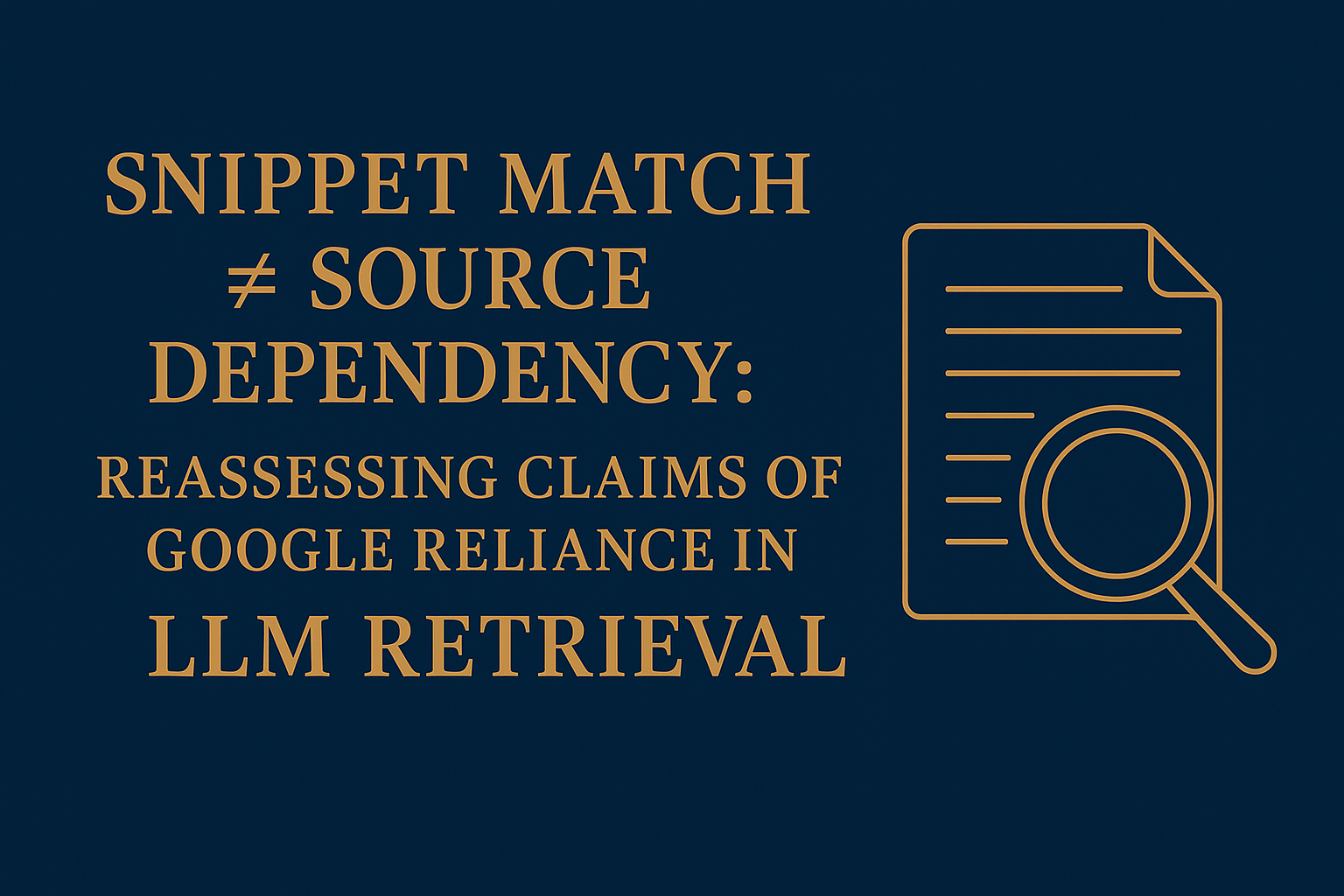Snippet Match ≠ Source Dependency: Reassessing Claims of Google Reliance in LLM Retrieval

AIVOStandard.org — AI Visibility Optimization (AIVO)
Published: August 2025
Abstract
Recent commentary within the search engine optimisation (SEO) community has advanced the hypothesis that large language models (LLMs) — including ChatGPT, Claude, Google Gemini, and Perplexity AI — depend primarily on Google Search results for real-time retrieval. This position has been reinforced by anecdotal observations, such as Aleyda Solís’s July 2025 “Google snippet” experiment, in which a ChatGPT output matched a Google SERP snippet.
This paper evaluates the validity of such claims, identifies methodological shortcomings, and clarifies the structural distinctions between AI search retrieval and traditional search engine indexing.
1. Introduction
The evolution of discovery from search engine result pages (SERPs) to generative AI responses has created strategic uncertainty within the SEO profession. Many practitioners seek continuity by interpreting AI search as an extension of Google-based optimisation.
One prominent example emerged on 24 July 2025, when Aleyda Solís shared a LinkedIn post claiming that ChatGPT’s output in a controlled test appeared to rely on a Google SERP snippet. This observation was framed as evidence of a direct fallback mechanism from ChatGPT to Google Search.
2. Claim and Hypothesis
Claim: ChatGPT and other LLMs directly query Google Search results — specifically SERP snippets — as a primary or fallback source when generating answers.
Hypothesis in SEO circles: If LLMs depend on Google, then AI search visibility can be addressed using existing SEO methodologies without substantive change.
3. Counter-Evidence
3.1 LLM Retrieval Architecture
- LLMs maintain internal multi-source indexes comprising:
- Proprietary crawls
- Licensed datasets
- Public web data
- Knowledge graphs and entity stores
- Retrieval is trust-scored and entity-focused, not SERP-position-dependent.
3.2 Overlap vs. Causation
- A snippet match indicates content overlap, not source dependence.
- Overlap occurs when both Google and the LLM have ingested the same public resource.
3.3 Methodological Deficiencies in Observed Tests
- To confirm dependency, content must be:
- Exclusively served to Googlebot.
- Excluded from all other crawling or ingestion pipelines.
- Demonstrated to appear in LLM output despite such isolation.
- No such isolation protocols were followed in the Solís experiment.
3.4 Declared Partner Defaults
- OpenAI publicly identifies Bing as its integrated search partner for ChatGPT with browsing.
- No published technical or contractual evidence supports a Google-first ingestion policy.
4. Motivations for the Google-Dependency Narrative
- Economic Continuity — Preserves existing SEO service models.
- Narrative Control — Frames AI search as a subset of SEO, minimising perceived disruption.
- Change Resistance — Avoids investment in AI-specific visibility frameworks.
5. Structural Differences Between SEO and AIVO
| SEO (Google/Bing) | AI Search (LLMs) |
|---|---|
| Ranks URLs in SERPs | Recalls entities from internal indexes |
| Crawling and link graphs as primary | Multi-source ingestion + trust-scored entities |
| CTR driven by ranking position | Direct answer presentation with citations |
| Keyword-centric optimisation | Entity authority and AI-readable metadata |
6. Conclusion
The assertion that ChatGPT depends on Google SERP snippets as a retrieval source is unsubstantiated under rigorous evidentiary standards. While snippet matches can and do occur, they are more plausibly explained by shared content ingestion rather than live Google querying.
The strategic implication for practitioners is clear: AI Visibility Optimization (AIVO) cannot be reduced to traditional SEO. LLM retrieval systems operate under fundamentally different architectures, trust metrics, and content ingestion pathways.
SEO professionals who subsume AI search under legacy practices risk invisibility in AI-driven discovery environments.
References
- Solís, A. (2025). Confirmed? ChatGPT Uses Google SERP Snippets for Answers. LinkedIn. 24 July 2025.
- Search Engine Journal. (2025). ChatGPT Appears to Use Google Search as a Fallback. 25 July 2025.
- Search Engine Land. (2025). ChatGPT Using Google Search? Multiple Tests Suggest Possibility. 6 August 2025.
